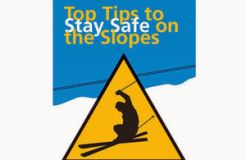
A survey of over 1,000 skiers and snowboarders has found that a quarter of skiers obtain injuries compared to only 13% of snowboarders. Half of these injuries (52%) were considered to be 'not that serious', but over a third (38%) were rated as serious, and over half (58%) ended up going to hospital as a result of their injury. On average, skiers and snowboarders lost nearly two days of their holiday as a result of the injury they sustained.
The survey was carried out on behalf of London Bridge Hospital, which operates a dedicated Winter Ski Clinic throughout its specialist Orthopaedic departments. It is not known if it considered how many ski trips the skiers had been on on average compared to the snowboarder sample.
The survey also found that only half (52%) of skiers consider themselves to be a safe skier and, just 28% of snowboarders admit to being safe; as well as that less than two thirds (60%) wear a helmet when skiing and just over a third (36%) wear a helmet when snowboarding.
Mr Simon Owen-Johnstone, comments: "Helmets do not make you invincible - it is still possible to sustain a head injury despite wearing a helmet, but research points to the benefits and there is no reason or excuse not to wear one."
Mr Christopher Uff, Consultant Neurosurgeon at London Bridge Hospital adds, "All ski hire shops offer ski helmets with ski and boot hire. Some people may have a misguided view that wearing a helmet is not 'cool', but the consequences of a slip can be devastating. Without a helmet, any head injury you sustain will be far more severe than if you were wearing a helmet. A helmet could mean that you recover faster and make any physical or psychological disability less severe. Of course you can still get a head injury with a helmet, but you may just walk away from it with a badly damaged helmet and bruised ego."
Whilst winter sports holidays are a chance for adventure, Mr. Simon Owen-Johnstone, a Consultant Orthopaedic Surgeon at London Bridge Hospital, urges people not to push themselves beyond their capabilities; "Every winter my clinics are full of injured skiers and boarders who have simply been too ambitious. Staying safe is all about being sensible. Making a realistic assessment of the environment, and your own abilities. If you're in a party, the least able sets the pace. Be ready to change plans, don't overestimate your ability, and don't be too proud to admit defeat."
In terms of the injuries sustained, Mr Simon Owen-Johnstone states "upper limb winter sports injuries are not as common as lower limb injuries. Sprains and strains are the most common, but after those the most likely are shoulder dislocations, collarbone fractures and disruptions of the acromio-clavicular joint, located at the end of the collarbone."
Commenting on the preparation for holidays Mr Simon Owen-Johnstone continues, "winter sport is hard athletic activity. It's not something you can do well after 51 weeks of inactivity. To enjoy it properly you'll need to have a level of fitness, and that needs to start at least six weeks before departure, preferably longer. Thigh and knee endurance is the most useful, but spine flexibility is important too.
"If you get injured, whether you have treatment abroad or not, you're likely to need ongoing care on return to the UK. Injuries take time to recover. Some injuries are not apparent until days or weeks later, so if you have symptoms when you're home they should really be checked out.
"The best advice I can give you is accept that your ten-year old is a better skier and don't try to keep up!" concludes Mr Simon Owen-Johnstone.
The Royal Society for the Prevention of Accidents states that approximately 10,000 UK skiers and snowboarders are admitted to hospital every year with injuries following their winter-sports holidays.
